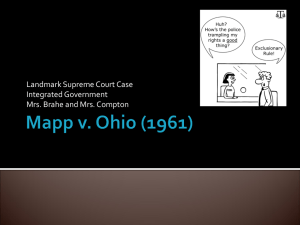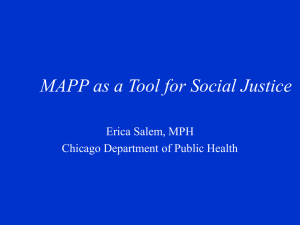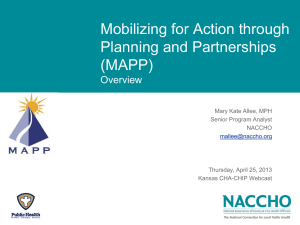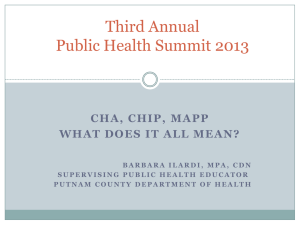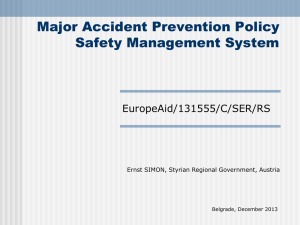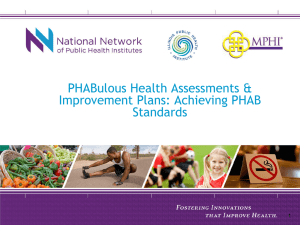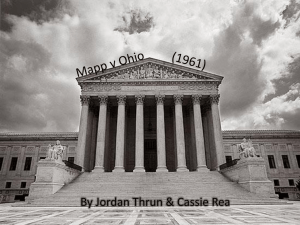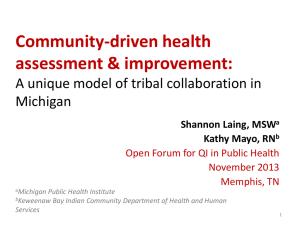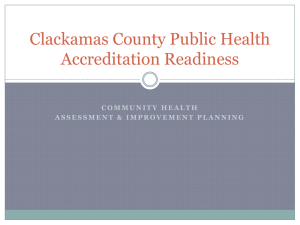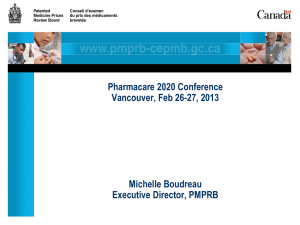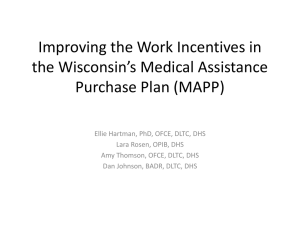GPSII/MAPP Leader`s Guide: Meetings 1–10 PPT
advertisement
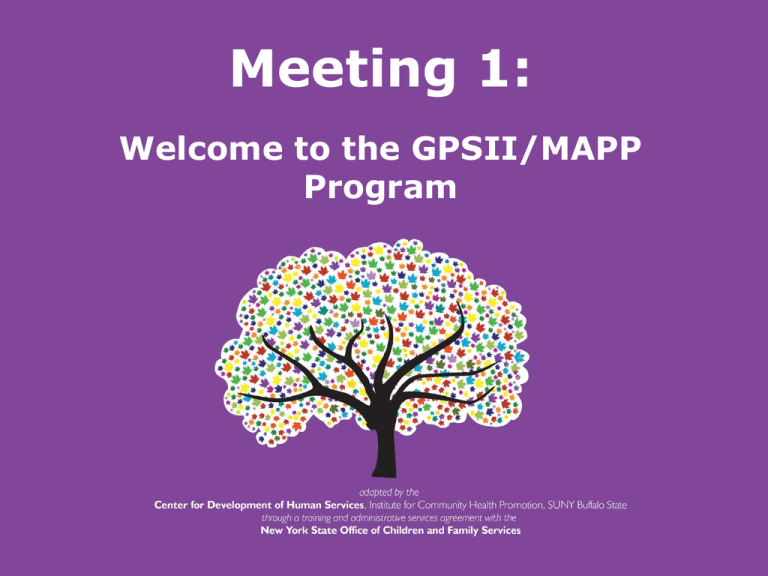
Meeting 1: Welcome to the GPSII/MAPP Program New York State Office of Children and Family Services. License Rights to OCFS Center for Development of Human Services, Institute for Community Health Promotion, SUNY Buffalo State acknowledges the State of New York’s and the Office of Children and Family Services’ royalty-free, non-exclusive and revocable license to reproduce, publish, distribute, or otherwise use any and all material herein for the limited purpose of training GPSII/MAPP Leaders and for as long as such materials and such training are deemed appropriate by NYS OCFS. The Children’s Alliance of Kansas (CAOK) is the current national owner of the copyrighted “toolbox” of MAPP programs. NYS Office of Children and Family Services (NYS OCFS)/Center for Development of Human Services (CDHS) has permission from CAOK to provide MAPP programs (GPSII/MAPP, Caring For Our Own, Deciding Together, Shared Parenting, Mini-MAPP, and Child Sexual Abuse) to certify leaders through leader certification workshops and directly to foster/adoptive parents in New York State. In order to better meet the needs of children and families in New York State, PSMAPP was revised in 2004 and renamed GPSII/MAPP. Further revisions were made in 2005 after considering the feedback from MAPP Leaders throughout the state, and minor revisions and reformatting occurred in 2009. Significant revisions to the content and updating to reflect best practice and legal changes in New York State were made and approved by NYS OCFS in 2012 for this edition. © 2009 Children’s Alliance of Kansas. Revised with permission NYS OCFS. GPSII/MAPP Leader’s Guide September 2014 New York State Office of Children and Family Services. 2 Matching Activity ♦ Find your match. ♦ Introduce yourself (name, where you live, what brought you here). ♦ Introduce your match. GPSII/MAPP Leader’s Guide September 2014 New York State Office of Children and Family Services. 3 Successful Teams ♦ Name one achievement of your team. ♦ Name one quality that made your team successful. (3 minutes) GPSII/MAPP Leader’s Guide September 2014 New York State Office of Children and Family Services. 4 Ways Information is Shared in the GPSII/MAPP Program ♦ Participation in meetings ♦ Written materials ♦ Family consultations ♦ References GPSII/MAPP Leader’s Guide September 2014 New York State Office of Children and Family Services. 5 Important Definitions ♦ ♦ ♦ ♦ ♦ ♦ ♦ Safety Permanencey Permanency Planning Well-being Foster Care Adoption Concurrent Planning GPSII/MAPP Leader’s Guide September 2014 New York State Office of Children and Family Services. 6 Partnering for Safety and Permanency Children, Youth, and Parents Talk About Foster Care and Adoption In order of appearance: ♦ Nicole, daughter of Peggy, currently in foster care ♦ Desiree, daughter of Peggy, currently in foster care ♦ Peggy, birth mother GPSII/MAPP Leader’s Guide September 2014 New York State Office of Children and Family Services. 7 ♦ Dantavius, adopted son of Lynetta, brother of Moses ♦ Moses, adopted son of Lynetta, brother of Dantavius ♦ Lynetta, adoptive mother GPSII/MAPP Leader’s Guide September 2014 New York State Office of Children and Family Services. 8 ♦ Angela, daughter of Denise, formerly in foster care ♦ Teddy, son of Denise, formerly in foster care ♦ Michelle, daughter of Denise, formerly in foster care ♦ Denise, birth mother GPSII/MAPP Leader’s Guide September 2014 New York State Office of Children and Family Services. 9 Roadwork ♦ Read Meeting 1 handouts – bring questions to Meeting 2. ♦ Talk about partnerships. ♦ Complete your Family Profile. Call with any questions. GPSII/MAPP Leader’s Guide September 2014 New York State Office of Children and Family Services. 10 Meeting 2: Where the MAPP Leads: A Foster Care and Adoption Experience New York State Office of Children and Family Services. Erikson's Stages of Development* * Erickson, E.H. Childhood and Society, 2d ed. NY: WW Norton, 1963. GPSII/MAPP Leader’s Guide September 2014 New York State Office of Children and Family Services. 12 Assessing Well-Being Needs of Children and Youth –Small Group Directions– ♦ Select recorder/reporter. ♦ Use case examples and worksheets to continue assessment. ♦ After 8 to 10 minutes be ready to share assessment. GPSII/MAPP Leader’s Guide September 2014 New York State Office of Children and Family Services. 13 Roadwork ♦ Complete Strengths/Needs Worksheet and Feedback to the Leader(s) – bring to Meeting 3. ♦ Review Meeting 2 handouts. ♦ Read Meeting 1, Handout 3. ♦ Complete the Profile or schedule your Family Consultation. GPSII/MAPP Leader’s Guide September 2014 New York State Office of Children and Family Services. 14 Meeting 3: Losses and Gains: The Need to Be a Loss Expert New York State Office of Children and Family Services. Developmental Grieving Developmental grieving is grieving experienced at milestones in a person's life. It could also be triggered by memories of previous losses. GPSII/MAPP Leader’s Guide September 2014 New York State Office of Children and Family Services. 16 Understanding and Helping Children Who Are Grieving ♦ Select a recorder and a reporter. ♦ Write answers to questions on Handout 4 on the flipchart. ♦ Be ready to report in 7 minutes. GPSII/MAPP Leader’s Guide September 2014 New York State Office of Children and Family Services. 17 Helping Children with Healthy Grieving – Family Strengths and Needs ♦ Find another family. ♦ Use Handout 5. ♦ Discuss your individual and family situational losses. ♦ Discuss strengths and needs these losses create for you in helping children who are grieving. ♦ You have 10 minutes. GPSII/MAPP Leader’s Guide September 2014 New York State Office of Children and Family Services. 18 Roadwork ♦ Review Meeting 3 handouts. ♦ Bring questions to Meeting 4. ♦ Complete Meeting 3, Handout 6, if appropriate. ♦ Schedule your family consultation. GPSII/MAPP Leader’s Guide September 2014 New York State Office of Children and Family Services. 19 Meeting 4: Helping Children with Attachments New York State Office of Children and Family Services. The Basic Needs of Humans* *Adapted from concepts developed by Abraham Maslow. GPSII/MAPP Leader’s Guide September 2014 New York State Office of Children and Family Services. 21 Definition of Attachment Attachment is the affectionate and emotional tie between people that continues indefinitely over time and lasts even when people are geographically apart.* * Fahlberg, Vera. “Attachment and Separation” PROJECT CRAFT, Training in the Adoption of Children with Special Needs. Ann Arbor, MI: University of Michigan School of Social Work, 1980, pp. V-1 - V-93. GPSII/MAPP Leader’s Guide September 2014 New York State Office of Children and Family Services. 22 Why Attachment Is Important to Children Attachment helps children: ♦ Develop a conscience (moral/spiritual development) ♦ Become independent (social development) ♦ Deal with stress, frustration, fear and worry (emotional development) GPSII/MAPP Leader’s Guide September 2014 New York State Office of Children and Family Services. 23 Why Attachment Is Important to Children (continued) Attachment helps children: ♦ Think logically (mental development) ♦ Develop future relationships (social development) ♦ Grow physically and develop health (physical development) GPSII/MAPP Leader’s Guide September 2014 New York State Office of Children and Family Services. 24 The Cycle of Need: Mistrust GPSII/MAPP Leader’s Guide September 2014 New York State Office of Children and Family Services. 25 Promoting, Building, Rebuilding and Supporting Attachments ♦ Select a group facilitator and a reporter. ♦ Read your case example. ♦ Answer the questions. ♦ Be ready in 15 minutes. GPSII/MAPP Leader’s Guide September 2014 New York State Office of Children and Family Services. 26 Roadwork ♦ Complete Strengths/Needs Worksheet and Feedback to the Leader(s) – bring to Meeting 5. ♦ Review Meeting 4 handouts. ♦ Be prepared to tell the group about 3 behaviors that “push your buttons.” GPSII/MAPP Leader’s Guide September 2014 New York State Office of Children and Family Services. 27 Meeting 5: Helping Children and Youth Learn To Manage Their Behaviors New York State Office of Children and Family Services. Discipline Techniques to Help Children and Youth Manage Their Behaviors ♦ Place each Post-It TM under a technique that might be effective with that behavior. ♦ Be ready to share ideas. GPSII/MAPP Leader’s Guide September 2014 New York State Office of Children and Family Services. 29 Choosing Effective Discipline Strategies ♦ Select a facilitator. ♦ Select recorder/reporter. ♦ Use handouts 5, 7, and 8 to analyze behaviors and plan interventions. ♦ Describe how the strategies will provide for safety and teach a child to manage behavior. ♦ Be prepared to report in 12 minutes. GPSII/MAPP Leader’s Guide September 2014 New York State Office of Children and Family Services. 30 False Allegations of Abuse in Foster and Adoptive Homes ♦ Naïve False Allegations – made when a child is confused or mixes fantasy with reality. ♦ Manipulative False Allegations – made by a child, youth or adult in order to get desired behavior from foster or adoptive family or agency. GPSII/MAPP Leader’s Guide September 2014 New York State Office of Children and Family Services. 31 Roadwork ♦ Read Handouts 10, 12, 13, and 14. ♦ Complete Handout 11, Strengths/Needs Worksheet for Meeting 5. GPSII/MAPP Leader’s Guide September 2014 New York State Office of Children and Family Services. 32 Meeting 6: Helping Children with Birth Family Connections New York State Office of Children and Family Services. Identity and Culture ♦ Identity ♦ Self-concept ♦ Connections ♦ Culture GPSII/MAPP Leader’s Guide September 2014 New York State Office of Children and Family Services. 34 Indian Child Welfare Act (ICWA) The Indian Child Welfare Act: ♦ Provides funds to tribes to operate child and family services programs; ♦ Gives tribes exclusive jurisdiction over any American Indian child who resides within the reservation; ♦ Gives tribal courts exclusive jurisdiction over any child who is a ward of the tribal court. GPSII/MAPP Leader’s Guide September 2014 New York State Office of Children and Family Services. 35 Multiethnic Placement Act of 1994 (MEPA) and Amendment of 1996 (IEP) ♦ Decreases the time children wait to be adopted; ♦ Prohibits denial or placement delays (by any agency receiving federal funds) because of race, color, or national origin; ♦ Encourages transracial placements when appropriate same-race placements are not available; GPSII/MAPP Leader’s Guide September 2014 New York State Office of Children and Family Services. 36 Multiethnic Placement Act of 1994 (MEPA) and Amendment of 1996 (IEP) (continued) ♦ Prevents discrimination in child placement or in the choice of foster and adoptive homes, based on race, color, or national origin; ♦ Develops a diverse pool of foster and adoptive families. GPSII/MAPP Leader’s Guide September 2014 New York State Office of Children and Family Services. 37 The Alliance Model of Child Welfare Practice* *Adapted from Thomas D. Morton, “Partnerships in Parenting,” CWI. GPSII/MAPP Leader’s Guide September 2014 New York State Office of Children and Family Services. 38 The Role of Foster Parents in Building Alliances with Parents of Children in Foster Care ♦ Recognize and support parent strengths ♦ ♦ ♦ ♦ ♦ Use strengths to engage parents Maintain confidentiality Manage personal emotions Share power and control Model parenting skills, mentor and/or teach parents GPSII/MAPP Leader’s Guide September 2014 New York State Office of Children and Family Services. 39 Directions for Competition Your team has 5 minutes to create as many ideas as possible for sharing parenting between visits. GPSII/MAPP Leader’s Guide September 2014 New York State Office of Children and Family Services. 40 Roadwork ♦ Complete the “Foster and Adoptive Parents’ Guide for Successful Visits or Contacts.” ♦ Write a letter to the parent of a child who may be placed in your home using Handout 10. ♦ Read Handouts 4, 5, 6, and 7. GPSII/MAPP Leader’s Guide September 2014 New York State Office of Children and Family Services. 41 Meeting 7: Gains and Losses: Helping Children Leave Foster Care New York State Office of Children and Family Services. Helping Children Transition from Foster Care ♦ Select a reporter and a recorder. ♦ Write one strategy– something the foster parent can say or do–for each message. ♦ Be ready to share in 10 minutes. GPSII/MAPP Leader’s Guide September 2014 New York State Office of Children and Family Services. 43 Stages of a Disruption or Dissolution GPSII/MAPP Leader’s Guide September 2014 New York State Office of Children and Family Services. 44 Planning to Prevent a Disruption ♦ Select a recorder/reporter. ♦ Read the case examples. ♦ Write preventions and interventions for each case example. ♦ Be prepared to share in 5 minutes. GPSII/MAPP Leader’s Guide September 2014 New York State Office of Children and Family Services. 45 Assessing Your Own Families ♦ Select a facilitator. ♦ Each person shares at least two ideas. ♦ For 3 minutes discuss: - A stressful situation that could lead to a disruption in your home. - A strategy to intervene or prevent a possible disruption in your home. GPSII/MAPP Leader’s Guide September 2014 New York State Office of Children and Family Services. 46 Giving Permission: The Steps of Integration GPSII/MAPP Leader’s Guide September 2014 New York State Office of Children and Family Services. 47 Roadwork ♦ Complete your Strengths/ Needs Worksheet. ♦ Read Handouts 12 through 17 and discuss them with friends and/or family members. ♦ Complete Handout 18. GPSII/MAPP Leader’s Guide September 2014 New York State Office of Children and Family Services. 48 Meeting 8: Understanding the Impact of Fostering or Adopting New York State Office of Children and Family Services. Family as a System ♦ ♦ ♦ ♦ Family Boundaries Family Rules Family Roles Family Patterns of Decision Making ♦ Family Patterns of Communication GPSII/MAPP Leader’s Guide September 2014 New York State Office of Children and Family Services. 50 Roadwork ♦ Review all the handouts. ♦ Complete Handout 10, “Creating an EcoMap-Worksheet” and bring to Meeting 9. ♦ Complete Handout 11, “First Day,” for the next family consultation. GPSII/MAPP Leader’s Guide September 2014 New York State Office of Children and Family Services. 51 Roadwork ♦ Complete Handout 12, “Teamwork Roles of Foster and Adoptive Parents Worksheet,” and bring to Meeting 9. GPSII/MAPP Leader’s Guide September 2014 New York State Office of Children and Family Services. 52 Meeting 9: Teamwork and Partnership in Foster Care and Adoption New York State Office of Children and Family Services. Partnership Building and Teamwork in Foster Care GPSII/MAPP Leader’s Guide September 2014 New York State Office of Children and Family Services. 54 Partnership Building and Teamwork in Foster Care (continued) GPSII/MAPP Leader’s Guide September 2014 New York State Office of Children and Family Services. 55 Key Concepts in Child Welfare ♦ ♦ ♦ ♦ ♦ ♦ ♦ ♦ ♦ ♦ Foster Care Adoption Child Protective Services Termination of Parental Rights (TPR) Physical Abuse Sexual Abuse Neglect Well-being Permanence Permanency Planning GPSII/MAPP Leader’s Guide September 2014 New York State Office of Children and Family Services. 56 Key Concepts in Child Welfare ♦ ♦ ♦ ♦ ♦ ♦ ♦ ♦ ♦ ♦ (continued) Concurrent Planning Safety Case Review Timeliness Reasonable Efforts Full Disclosure Searching for Relatives Case or Family Conferencing Permanency Hearing Confidentiality GPSII/MAPP Leader’s Guide September 2014 New York State Office of Children and Family Services. 57 Roadwork ♦ Complete your final “Strengths/Needs Worksheet” and bring it to Meeting 10. ♦ Read Handouts 7 and 10. GPSII/MAPP Leader’s Guide September 2014 New York State Office of Children and Family Services. 58 Meeting 10: Endings and Beginnings New York State Office of Children and Family Services. Instructions for Final Strengths/Needs Discussion ♦ Share your decision – to foster, to adopt, to foster/adopt, or to help children and families in another way. ♦ Describe what helped you make your decision. ♦ For those who have decided to be foster or adoptive parents, how have your ideas about the type of child who would fit into your family changed or remained the same? ♦ What do you see as your new strengths after participating in the GPSII/MAPP program? ♦ What do you see as your needs after participating in the GPSII/MAPP program? GPSII/MAPP Leader’s Guide September 2014 New York State Office of Children and Family Services. 60
